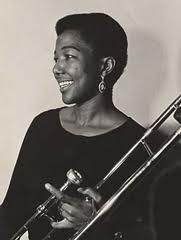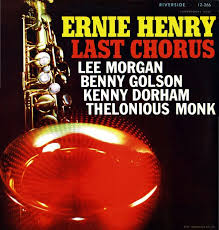Melba's Tune – Melba Liston
Melba Liston wrote this lush ballad for alto saxophonist Ernie Henry, and he plays it like it is an American standard.
- Recording: Ernie Henry - Last Chorus
- Recorded on: September 23, 1957
- Label: Riverside (12-266)
- Concert Key: E-flat
- Vocal Range: , to
- Style: Ballad
- Trumpet - Lee Morgan
- Trombone - Melba Liston
- Alto Sax - Ernie Henry
- Tenor Sax - Benny Golson
- Bari Sax - Cecil Payne
- Piano - Wynton Kelly
- Bass - Paul Chambers
- Drums - Philly Joe Jones
Video
- Description
- Historical Notes
- Solos
- Piano Corner
- Bass Corner
- Drum Corner
- Guitar Corner
- Inside & Beyond
- Minus You
This ballad is in a style reminiscent of the great standards of the 1930s and '40s. While there are no lyrics, saxophonist Ernie Henry plays the melody on the recording as if there were—it would work very well with lyrics. The melody is almost entirely diatonic; however, there are some passing chords that establish the changes as a more bebop style.
On the recording, after the head there is an eight-measure interlude, like a second bridge, which is unrelated to the B section. The C section from the melody returns to end, with a tag; there are no solos on the recording. In our lead sheet, we have decided to open the AABC form of the head up for solos; the interlude would be played after these, as an alternative to taking the head out from the top or from the bridge.
The all-star lineup on this recording features a rhythm section that recorded many times together from 1957 to 1961. This was the rhythm section's second recording together; the first, five months earlier, was on Clark Terry's "Serenade To A Bus Seat" which also featured saxophonist Johnny Griffin.
Related Songs
Email Send Melba's Tune to a friend

Melba Liston
January 13, 1926 – April 23, 1999
A prodigious musical talent, Melba Liston learned piano at age six in her hometown of Kansas City, Missouri. By eight, she had already taken up trombone and was talented enough at it to play solos on the local radio. When her family moved cross-country to Los Angeles, she began studying with Alma Hightower and playing in local youth bands. Melba soon outgrew children's music programs; at the age of 16, she parted ways with her musical mentor and joined the musicians' union to become a professional. Though she was young, she quickly secured a regular gig at the Los Angeles Lincoln Theater, an opportunity that allowed her to begin composing and arranging for some of the local talent. Read more...

